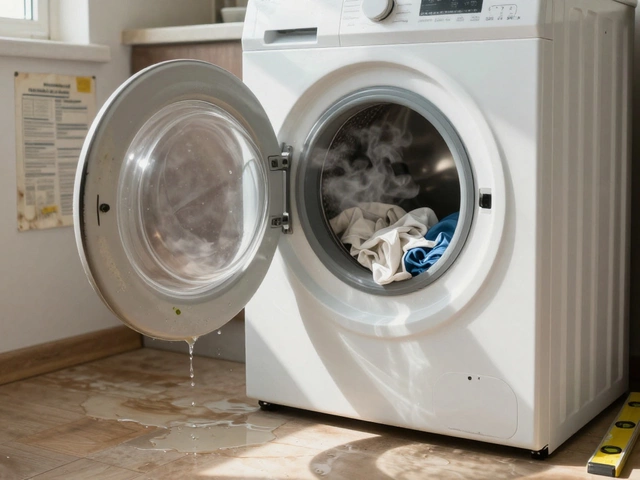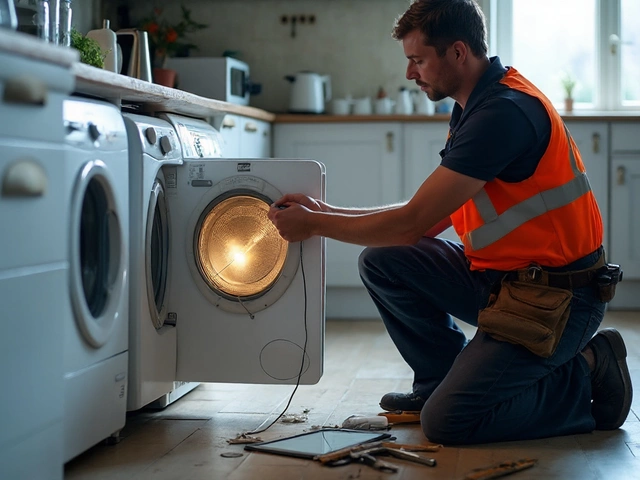Ever tried to heat up a quick snack and your microwave just hums or clicks and does nothing? That’s usually a sign that something inside has given up. Most of the time it’s a single part – like the motor, the high‑voltage transformer, or the heating element – that’s at fault. Knowing the usual suspects can save you time, money, and a lot of frustration.
The first place to look is the magnetron. This is the heart of the microwave; it creates the microwaves that heat your food. If it’s burnt out, the unit will run but stay cool. Next up is the door latch. A loose or broken latch triggers the safety circuit and stops the oven from operating. The turntable motor is another frequent culprit – if the plate won’t spin, the food can heat unevenly, and many microwaves won’t start at all. Finally, keep an eye on the high‑voltage capacitor and the fuse; they protect the electronics and can blow when the stove overheats.
Before you pick up the phone, try these quick tests. First, unplug the microwave and give it a good shake. If you hear loose parts rattling, the turntable motor or rollers might need replacement. Next, look at the interior for any burnt smells or visible scorch marks – that’s a magnetron warning. Check the door seal for cracks or broken clips; a simple re‑align can solve a safety lock issue. If the microwave clicks but never heats, the fuse or capacitor could be blown – you’ll need a multimeter to confirm, but many local repair shops can test it for cheap.
When you’ve pinpointed the part, compare the model number on the inside wall with the part number on the supplier’s list. Ordering the exact match saves you from the nightmare of returns. Swapping a faulty motor or fuse is usually a 15‑minute job with a screwdriver and a bit of patience. Just remember to discharge the capacitor first – it can hold a nasty charge even after you unplug the unit.
If you’re not comfortable opening the cabinet, or the problem involves the magnetron or high‑voltage transformer, it’s best to call a professional. Those components deal with high voltage and can be dangerous if mishandled. A qualified technician will also test the microwave’s power draw to make sure the issue isn’t an underlying electrical fault, which could cause repeated failures.
Bottom line: most microwave failures boil down to a single part. By checking the door latch, motor, fuse, and magnetron first, you can often decide whether a quick DIY fix will do or if it’s time for a pro. Either way, you’ll avoid the hassle of a cold meal and keep your kitchen humming smoothly.

Microwaves seem invincible until they suddenly stop working—usually right when you're hungry. This article tackles what actually breaks down most often in a microwave, from simple blown fuses to tricky magnetrons. You'll learn the telltale signs for each failure, why these things wear out, and how to figure out if it’s something you can fix yourself. Plus, there are practical tips on keeping your microwave running smoother for longer. Perfect for anyone tired of cold leftovers and expensive repair bills.

Most washing machines last 8-12 years, but signs like loud noises, leaks, or error codes mean it's time to consider repair or replacement. Learn how to extend its life and when it's better to buy new.

Choosing a cooker that stands the test of time can be daunting amid a sea of brands promising longevity. This article delves into which brands have stood out for their durability and reliability. By exploring user experiences and industry insights, it aims to guide you in the right direction. Discover how some brands maintain their reputation for endurance and what to consider when selecting your next appliance.

Front-load tub/drum assemblies and top-load transmissions are usually the priciest washer repairs. See real costs, how to diagnose, and when to fix or replace.

Wondering if you can flush your water heater yourself? Learn the step-by-step process, tools you'll need, and expert tips to extend your water heater's life.

When your dishwasher starts acting up, a quick, accurate diagnosis can save you from bigger headaches and pricey repairs. This article walks through simple methods to spot dishwasher problems, from weird noises to stubborn leaks. You'll learn what to check first, how to tell if it's a DIY fix, and when it's time to call in a pro. Handy tips and real-life examples make this guide easy to follow, even if you're not a born handyman. Don't let a small hiccup become a kitchen disaster — know what to look for and act fast.